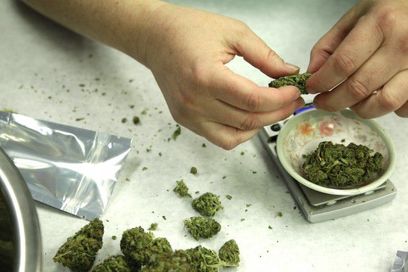 Ben Pollara Floridians voted for medical marjuana, now lawmakers need to make it viable for doctors to recommend it "If your dog got sick, and marijuana could help him, you'd have it in his food bowl tonight — not tomorrow — tonight." That statement — or a slight variation thereof — was made dozens of times by John Morgan while he campaigned for medical marijuana over the last four years. John is rarely wrong when opining on matters of human nature. I can now personally affirm that John's statement is true. Recently my veterinarian recommended trying marijuana as a potential treatment for my dog's chronic, undiagnosed and so far untreatable gastrointestinal issues. For years Keaton has had regular episodes — as often as two to three times a week — that include appetite loss, vomiting and loose, bloody stool. We've done repeated diagnostic testing, tried dietary changes, given him supplements and other treatments. Nothing has worked. After telling me he couldn't legally recommend marijuana for Keaton, my vet did exactly that. "There's no reason not to try it," he said. "It definitely won't hurt him and could help." His colleague had recently recommended a palliative course of marijuana for a cat undergoing cancer treatments. When I told him I had run the campaign to legalize medical marijuana, he shared that his wife had tried marijuana during chemo treatments and that she'd had a bad reaction to a marijuana edible, so didn't keep using it. But he also said that his brother has used marijuana for years for the treatment of his ulcerative colitis. Numerous times in the course of our conversation, he qualified statements about my dog's potential medical marijuana treatment by emphasizing that he cannot legally prescribe or specifically recommend medical marijuana. He's absolutely correct — even under the new amendment to Florida's constitution, which only contemplates doctors licensed to practice medicine in Florida. Veterinarians wouldn't qualify under the definition. Without the passage of a specific law legalizing marijuana for veterinary uses, I would have to procure marijuana illegally for Keaton. However, I believe that what my vet said, and how he said it, was almost certainly within the bounds of legality and would be considered protected free speech under the First Amendment to the U.S. Constitution. But if the Florida Legislature and/or the Department of Health choose to write implementing laws that require (human) medical doctors to specify dosages and route of administration for medical marijuana, physicians who do so will be putting themselves at greater potential liability than my veterinarian, whose profession is not protected under the Florida constitution. The current statute governing low-THC cannabis does just that, as does the first draft of DOH's implementing rule. The reason doctors would be at such liability lies at the core of medical marijuana laws' necessity: marijuana is a DEA Schedule I substance, illegal under federal law. Doctors cannot prescribe or order medical marijuana without risking the loss of their DEA license and possible federal prosecution. Irrespective of what you call it, requiring doctors to specify dosages and routes of administration can only be viewed as a prescription, putting doctors at risk. This is not a necessary risk. The constitution contains specific language designed to protect physicians based on the legal history of medical marijuana in other states. It says doctors must certify, in writing, that a patient has been diagnosed with a debilitating medical condition and that in the physician's professional opinion the potential benefits of medical marijuana outweigh the risks. The doctor must provide a suggested timeframe for the use of marijuana. That's it. They are not even explicitly recommending its use — they're simply affirming the above, in compliance with Florida law. A medical marijuana law that obviates risk to physicians — without whom there are no patients — means broader physician participation. Broader physician participation means doctors treating patients' underlying conditions are likelier to be the same doctor certifying their use of medical marijuana. That means there is less of a market for unethical "pot docs" issuing a disproportionate number of certifications. I won't say whether I'm going to break the law to treat my dog. There are a few brands of CBD-enriched hemp treats that can be ordered legally online that we'll try first. I love my dog, and I'm glad his vet was willing to have such an honest conversation, given the professional risks. But what if me, or my wife, or one of my kids fell ill and needed medical marijuana? I don't want to have to count on having a courageous doctor. I want doctors to be able to have honest, informed conversations with their patients, and so with comfort that they aren't breaking the law. Ben Pollara is the executive director of Florida for Care. He was the campaign manager for the successful effort to pass a constitutional amendment legalizing medical marijuana in Florida. Copyright © 2017
0 Comments
Leave a Reply. |
 RSS Feed
RSS Feed
